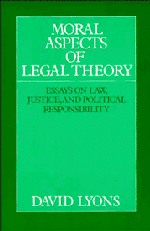Book contents
- Frontmatter
- Contents
- Preface
- Acknowledgments
- 1 The internal morality of law
- 2 On formal justice
- 3 Legal formalism and instrumentalism - a pathological study
- 4 Moral aspects of legal theory
- 5 Formal justice and judicial precedent
- 6 Derivability, defensibility, and the justification of judicial decisions
- 7 Constitutional interpretation and original meaning
- 8 A preface to constitutional theory
- 9 Basic rights and constitutional interpretation
- 10 Critical analysis and constructive interpretation
5 - Formal justice and judicial precedent
Published online by Cambridge University Press: 10 December 2009
- Frontmatter
- Contents
- Preface
- Acknowledgments
- 1 The internal morality of law
- 2 On formal justice
- 3 Legal formalism and instrumentalism - a pathological study
- 4 Moral aspects of legal theory
- 5 Formal justice and judicial precedent
- 6 Derivability, defensibility, and the justification of judicial decisions
- 7 Constitutional interpretation and original meaning
- 8 A preface to constitutional theory
- 9 Basic rights and constitutional interpretation
- 10 Critical analysis and constructive interpretation
Summary
Despite the encroachment of legislation on matters that used to lie within the province of the common law, considerable scope remains for the judicial practice of following precedent, without challenging the authority of written law. For decisions must still be rendered where legislation has not yet intervened, and interpretations of written law can be accorded precedential force.
Why should courts follow precedents? When past decisions are unobjectionable on their merits, the practice is relatively unproblematic. It might, perhaps, be justified by the usual argument that it makes judicial decisions more predictable. That justification hardly seems, however, to confront the fact that precedents may have been unfortunate, unwise, and unjust. Why should courts show any respect at all to such decisions?
This Article concerns an argument which, if sound, would support a doctrine of precedent with unlimited scope – one that would provide some justification, though not overwhelming justification, for following all precedents, however regrettable they may be. The argument holds that respect for precedent is required by the principle that like cases should be treated alike.
Although that argument is challenged here, no claim is made that a practice of precedent cannot be justified. The larger purpose of this Article is to clear the way for a systematic inquiry into the sound reasons for, as well as the legitimate scope of, such a practice.
The argument to be examined is sketched in section I.
- Type
- Chapter
- Information
- Moral Aspects of Legal TheoryEssays on Law, Justice, and Political Responsibility, pp. 102 - 118Publisher: Cambridge University PressPrint publication year: 1993
- 2
- Cited by



